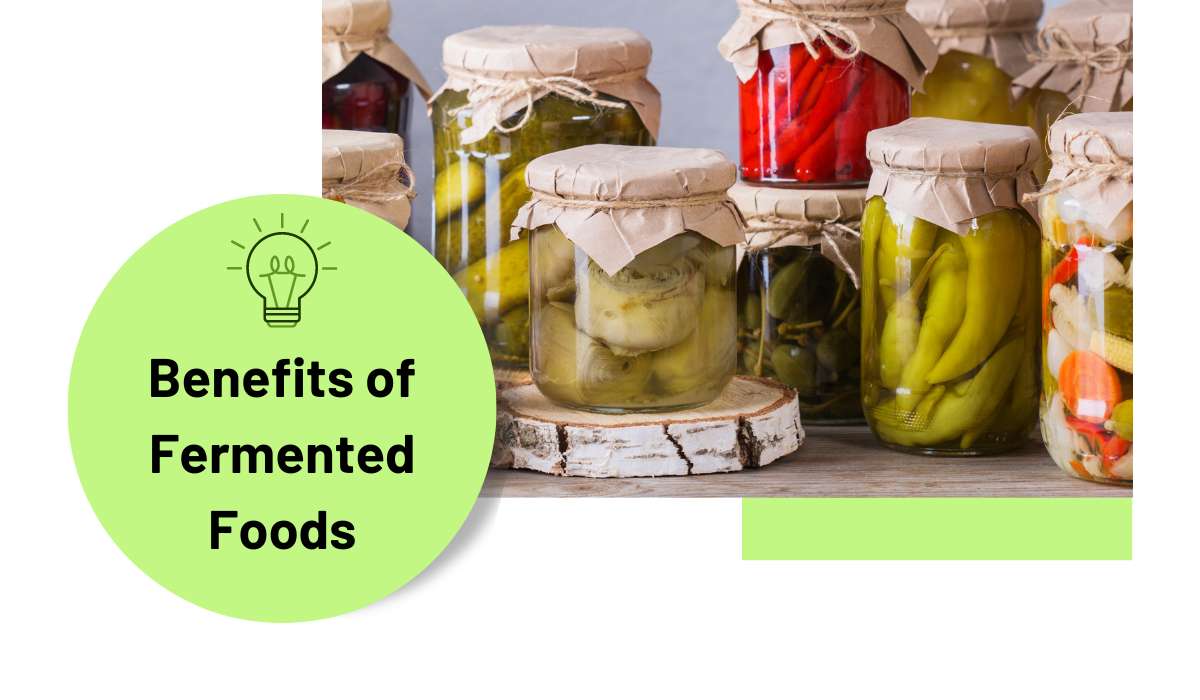Benefits of Fermented Foods have been consumed for centuries and are known for their numerous health benefits. They are made through a process called fermentation, in which natural bacteria or yeast convert sugars into acids, gases, or alcohol. This process enhances the flavor and texture of the food while also increasing its nutritional value.
These foods can be found in various cuisines around the world, including sauerkraut, kimchi, yogurt, kefir, and kombucha. They are rich in probiotics, which are beneficial bacteria that promote a healthy gut and overall well-being.
Adding fermented foods to your diet can have a positive impact on your digestion. The probiotics help to improve the balance of good bacteria in your gut, aiding in the digestion and absorption of nutrients. This can reduce digestive issues such as bloating, gas, and constipation.
Furthermore, the fermentation process increases the bioavailability of nutrients in these foods. This means that your body can better absorb and utilize the vitamins, minerals, and antioxidants present in fermented foods. This can contribute to better overall nutrition and support optimal health.
In addition to digestive benefits, consuming fermented foods can also boost your immune system. The probiotics stimulate the production of antibodies and strengthen the immune response. This can help protect against infections and reduce the severity of allergic reactions.
Overall, incorporating fermented foods into your diet can have numerous health benefits. From improved digestion and enhanced nutrient absorption to a boosted immune system, these foods offer a natural way to support your well-being. Consider adding fermented foods like yogurt or sauerkraut as part of your daily meals for optimal health and wellness.
Improved Digestion

Including fermented foods in your diet can contribute to improved digestion. These foods contain probiotics, which are beneficial bacteria that help maintain a healthy balance in your gut. By promoting the growth of good bacteria, fermented foods help to break down and digest food more effectively.
The probiotics in fermented foods can assist with reducing digestive issues such as bloating, gas, and constipation. These beneficial bacteria work to optimize the digestive process, allowing for better absorption of nutrients. This can lead to fewer digestive discomforts and a smoother digestion experience overall.
Fermented foods also contain enzymes that aid in the breakdown of complex carbohydrates and proteins. This can make it easier for your body to digest these nutrients and extract the maximum amount of energy from them.
Additionally, fermented foods provide fiber that is beneficial for gut health. Fiber acts as a prebiotic, providing nourishment for the good bacteria in your gut. This can help to promote a healthy microbial environment in your digestive system.
By incorporating fermented foods into your meals, you can support a healthier digestive system, experience less digestive discomfort, and improve nutrient absorption.
Enhanced Nutrient Absorption
Including fermented foods in your diet can have a significant impact on enhancing nutrient absorption. By consuming these foods, you are providing your body with beneficial bacteria and enzymes that aid in the breakdown of complex carbohydrates and proteins.
This breakdown process makes it easier for your body to digest and absorb these essential nutrients, ensuring that you get the maximum benefit from the foods you eat.
Fermented foods also contain fiber, which acts as a prebiotic in your gut. This fiber nourishes the good bacteria in your digestive system, creating a healthy environment for optimal nutrient absorption.
When your gut is populated with a healthy balance of good bacteria, the absorption of vitamins and minerals becomes more efficient. This means that the nutrients you consume through fermented foods are better utilized by your body.
By incorporating fermented foods into your meals, not only are you adding flavor and variety to your diet, but you are also promoting enhanced nutrient absorption. This can lead to increased energy levels, improved overall health, and a stronger immune system.
Start reaping the benefits of enhanced nutrient absorption by incorporating fermented foods into your daily meals and snacks. Your body will thank you for it!
Boosted Immune System

When it comes to your immune system, fermented foods can provide a significant boost. These foods are packed with beneficial bacteria that help strengthen your body’s natural defense system.
The probiotics found in fermented foods promote the growth of good bacteria in your gut. This, in turn, enhances your immune response by supporting the production of antibodies and immune cells.
Consuming fermented foods regularly can also help reduce inflammation in your body. Chronic inflammation can weaken your immune system, making you more susceptible to illness and disease. By reducing inflammation, fermented foods help your immune system function optimally.
Furthermore, fermented foods contain a variety of vitamins, minerals, and antioxidants that support overall immune health. These nutrients include vitamin C, zinc, selenium, and beta carotene, which all play crucial roles in maintaining a strong immune system.
Incorporating fermented foods into your diet can help fortify your body’s defenses against infections and diseases. So grab some sauerkraut, kimchi, or yogurt and give your immune system the boost it needs!
However, it’s important to note that everyone’s immune system is different, and individual results may vary. If you have any underlying health conditions or concerns, it’s best to consult with a healthcare professional before making significant changes to your diet.
Remember to enjoy fermented foods as part of a balanced diet and maintain a healthy lifestyle to fully reap the benefits on your immune system. Stay healthy and well!
Weight Management
:max_bytes(150000):strip_icc()/FermentedFoods-8c6a0d1b670346a4be3c93523bd7f7fd.jpg)
Weight Management
In addition to their immune-boosting benefits, incorporating fermented foods into your diet can also aid in weight management. These foods help regulate appetite and support a healthy metabolism.
Fermented foods are low in calories and rich in fiber, which can help you feel fuller for longer periods. This can prevent overeating and contribute to weight loss or weight maintenance.
Furthermore, the probiotics found in fermented foods have been shown to promote a healthy balance of gut bacteria. Imbalances in gut bacteria have been linked to obesity and weight gain. By consuming fermented foods, you can support the growth of beneficial bacteria and improve your overall gut health.
Studies have also suggested that consuming fermented foods may increase the production of short-chain fatty acids (SCFAs) in the gut. SCFAs are known to play a role in reducing body fat levels and enhancing energy metabolism.
However, it’s essential to note that while fermented foods can be beneficial for weight management, they should be enjoyed as part of a balanced diet and healthy lifestyle. Incorporate a variety of nutrient-rich foods into your meals and engage in regular physical activity for optimal results.
Remember, individual results may vary, and it’s always a good idea to consult with a healthcare professional or registered dietitian before making any significant changes to your diet. Stay mindful of portion sizes and listen to your body’s hunger cues to maintain a healthy weight.
Conclusion
Incorporating fermented foods into your diet can provide you with a wide range of benefits. These foods are not only delicious but also offer numerous health advantages. From improved digestion to enhanced nutrient absorption, boosted immune system, and weight management, fermented foods have a lot to offer.
Adding fermented foods like yogurt, sauerkraut, kimchi, kefir, and tempeh to your meals can improve your gut health and promote the growth of beneficial bacteria. This can lead to better digestion, reduced bloating, and improved overall gut function.
Additionally, fermented foods contain valuable nutrients that are more easily absorbed by the body. This means you can get more nutritional benefits from the foods you eat.
Furthermore, consuming fermented foods can strengthen your immune system by supporting the growth of healthy gut bacteria and boosting the production of antibodies.
When it comes to weight management, fermented foods can help regulate appetite, increase feelings of fullness, and support a healthy metabolism. They are also low in calories and high in fiber, which can contribute to weight loss or maintenance.
It’s important to note that while fermented foods have many advantages, they should be consumed as part of a balanced diet. Remember to listen to your body’s hunger cues and maintain portion control.
In conclusion, incorporating fermented foods into your diet is a simple yet effective way to improve your overall health and well-being. So why not enjoy these tasty and nutritious foods today?
Incorporating Benefits of Fermented Foods
Incorporating fermented foods into your diet is an easy and delicious way to improve your overall health. Start by adding a serving of yogurt or kefir to your breakfast. These dairy products are rich in probiotics, which can support a healthy gut and aid in digestion.
You can also enjoy sauerkraut or kimchi as a tasty and tangy side dish. These fermented vegetables not only add flavor to your meals but also provide you with beneficial bacteria that promote a healthy gut microbiome.
For a protein-packed option, try including tempeh in your stir-fries or salads. Tempeh is a fermented soy product that is high in nutrients and adds a unique texture to your dishes.
If you’re new to fermented foods, start with small portions and gradually increase the amount over time. This will allow your body to adjust to the introduction of beneficial bacteria.
Incorporating fermented foods into your diet doesn’t have to be complicated. Simply choose a few different options that you enjoy and include them in your meals regularly.
Remember, variety is key when it comes to fermented foods, so don’t be afraid to experiment with different flavors and types. Your taste buds and your gut will thank you for it!
Moreover, some fermented foods are high in sodium, such as sauerkraut and pickles. If you’re following a low-sodium diet or have high blood pressure, it’s advisable to consume these foods in moderation and opt for low-sodium alternatives when available.
Lastly, homemade fermented foods may carry a higher risk of contamination compared to commercially prepared products. Proper hygiene practices and ensuring the use of fresh and clean ingredients are crucial when fermenting food at home.
By being mindful of these potential risks and taking necessary precautions, you can safely enjoy the numerous benefits that fermented foods have to offer.
For More Blogs visit Aerns

